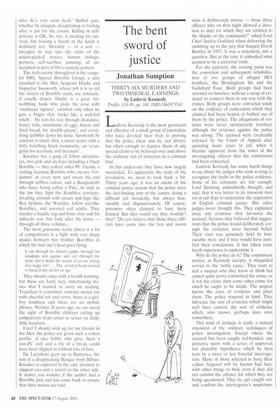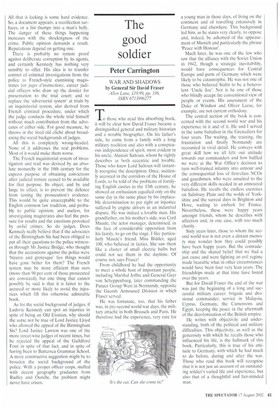The bent sword of justice
Jonathan Sumption
THIRTY-SIX MURDERS AND TWO IMMORAL EARNINGS by Ludovic Kennedy Profile, £16.99, pp. 340, ISBN1861973543 Lclovic Kennedy is the most persistent and effective of a small group of journalists who have devoted their lives to proving that the police cheat and lie, not always, but often enough to deprive them of any special claim to be believed over and above the ordinary run of witnesses in a criminal trial.
In this endeavour they have now largely succeeded. To appreciate the scale of the revolution, we need to look back a bit. Thirty years ago, it was an axiom of the criminal justice system that the police were the fact-finding arm of the courts, doing a difficult job woodenly, but always honourably and dispassionately. Of course, prisoners often claimed to have been framed. But they would say that, wouldn't they? 'Do you believe that those three officers have come into the box and sworn what is deliberately untrue — those three officers who on that night showed a devotion to duty for which they are entitled to the thanks of the community?' asked Lord Chief Justice Goddard when delivering the summing up to the jurythat hanged Derek Bentley in 1953. It was a statement, not a question. But at the time it embodied what seemed to be a universal truth.
For the judiciary, the turning point was the conviction and subsequent rehabilitation of two groups of alleged IRA bombers, the Birmingham Six and the Guildford Four. Both groups had been arrested on hunches, without a scrap of evidence to connect them in any way with the crimes. Both groups were convicted solely on the evidence of confessions which they claimed had been beaten or bullied out of them by the police. The allegations of violence were never satisfactorily resolved, although the evidence against the police was strong. The accused were eventually released by the Court of Appeal after spending many years in jail, when it became apparent from the notes of the investigating officers that the confessions had been concocted.
Ludovic Kennedy has some harsh things to say about the judges who took so long to recognise the faults in the police evidence. Some of his criticisms are fair enough. Lord Denning undoubtedly thought, and said, that it was better to let innocent men rot in jail than to undermine the reputation of English criminal justice. But other judges never thought this. They explained away any evidence that favoured the accused, because they believed that suggestions that the police would deliberately corrupt the evidence were beyond belief. Their view was genuinely held by honourable men, and if true would have justified their conclusions. It has taken some harsh experience to undermine it.
Why do the police do it? The commonest motive, as Kennedy accepts, is misguided service to the 'noble cause'. They want to nail a suspect who they know or think but cannot quite prove committed the crime, or if not the crime then some other crime for which he ought to be inside. The suspect knows the rules of evidence and plays them. The police respond in kind. They fabricate the sort of evidence which might well have existed; the sort of evidence which, who knows, perhaps does exist somewhere.
This kind of attitude is really a natural extension of the ordinary techniques of police investigation. Except where the accused has been caught red-handed, any detective starts with a series of unproven but plausible hypotheses which he then tests by a more or less forceful interrogation. Many of those selected to have their collars fingered will be known bad hats, with other things to hide even if they did not commit the offence for which they are being questioned. They lie, get caught out, and confirm the interrogator's suspicions.
Al] that is lacking is some hard evidence. So, a document appears, a recollection surfaces, or a fist thumps into a man's belly. The danger of these things happening increases with the shockingness of the crime. Public opinion demands a result. Reputations depend on getting one.
There is probably no system proof against deliberate corruption by its agents, and certainly Kennedy has nothing very sensible to offer. His idea is to transfer control of criminal investigations from the police to French-style examining magistrates (or juges dinsn-uction), career judicial officers who draw up the dossier for presentation to the trial court; and to replace the 'adversarial system' at trials by an inquisitorial system, also derived from
French criminal procedure, under which the judge conducts the whole trial himself without much contribution from the advocates of either side. For good measure, he throws in the tired old cliche about broadening the social backgrounds of judges.
All this is completely wrong-headed. None of it addresses the real problems. Most of it would make them worse.
The French inquisitorial system of investigation and trail was devised by an abso lute monarchy in the 18th century for the express purpose of obtaining convictions after judicial torture ceased to be available for that purpose. Its object, and by and large its effect, is to prevent the defence from testing the prosecution's evidence.
This would be quite unacceptable to the English common law tradition, and probably to public opinion; and useless, for investigating magistrates also feel the pres sure for results and the emotions provoked by awful crimes. So do judges. Does Kennedy really believe that if the advocates of the Birmingham Six had been obliged to put all their questions to the police witness es through Mr Justice Bridge, who thought that the accusations against the police were 'bizarre and grotesque' lies things would have gone better for them? The French system may be more efficient than ours (more than 90 per cent of those prosecuted are convicted), but one thing that cannot possibly be said is that it is fairer to the accused or more likely to avoid the injustices which fill this otherwise admirable book.
As for the social background of judges, if Ludovic Kennedy can spot an injustice in spite of being an Old Etonian, why should the same not be true of Lord Justice Lloyd who allowed the appeal of the Birmingham Six? Lord Justice Lawton was one of the more street-wise judges of recent times, but he rejected the appeal of the Guildford Four in spite of that fact, and in spite of
having been to Battersea Grammar School. A more constructive suggestion might be to
broaden the social background of the police. With a proper officer corps, stuffed with decent geography graduates from Radley and Oundle, the problem might never have arisen.































































 Previous page
Previous page